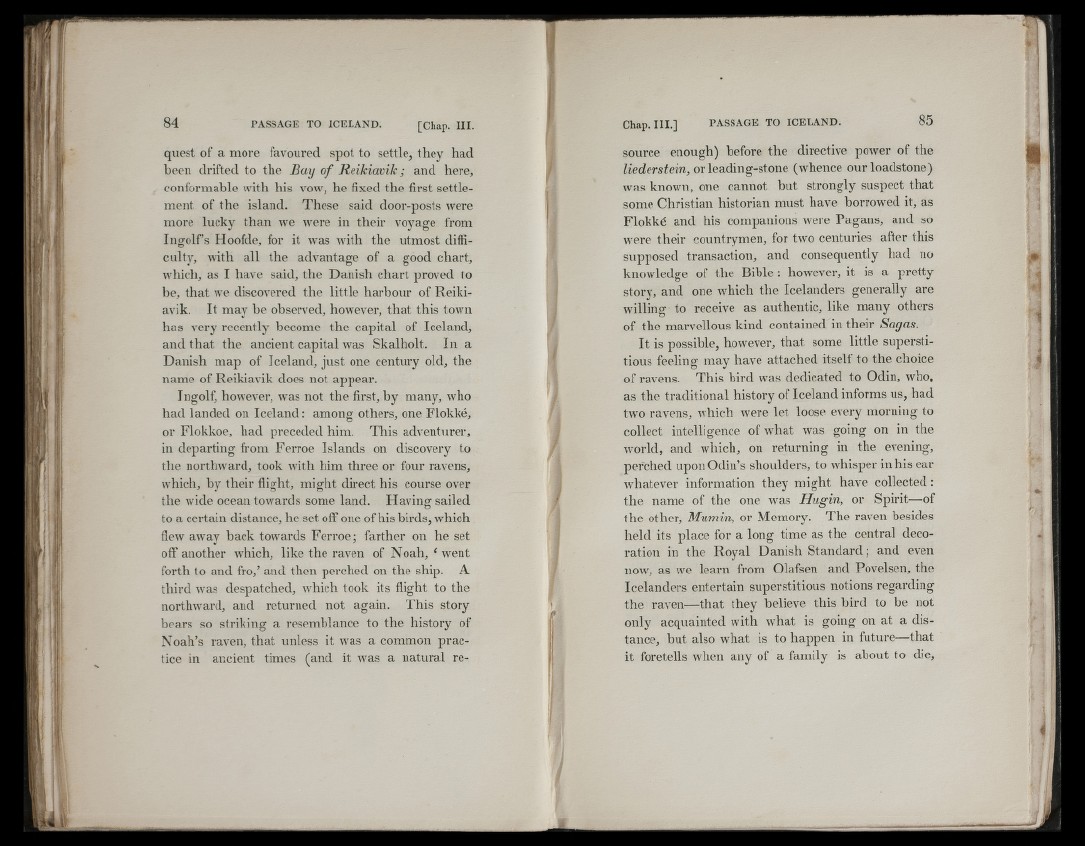
T’l ■'
I 5 m-i
. . 11 r
1*1 li i m .
t
I*
L f■
i-
L
I, Dvif
"T’*i
11
i )
i 4
is
84 PASSAGE TO ICELAND. [Chap. I I I .
quest of a more favoured spot to settle^ they had
been drifted to the B ay o f R eik ia vik; and here,
conformable with his vow, he fixed the first settlement
of the island. These said door-posts were
more lucky than Ave Avere in their voyage from
Ingolfs Hoofde, for it Avas Avith the utmost difficulty,
Avith all the advantage of a good chart,
AA'hich, as I have said, the Danish chart proved to
be, that Ave discoA'ered the little harbour of Reikiavik.
It may he observed, hoAvever, that this town
has very recently become the capital of Iceland,
and that the ancient capital Avas Skalholt. In a
Danish map of Iceland, just one century old, the
name of Reikiavik does not appear.
Tngolf, however, Avas not the first, by many, Avho
had landed on Iceland: among others, one Flokke,
or Flokkoe, had preceded him. This adventurer,
in departing from Ferroe Islands on discovery to
the northAvard, took Avith him three or four ravens,
Avhich, hy their flight, might direct his course over
the Avide ocean towards some land. Having sailed
to a certain distance, he set off one of his birds, which
flcAv aAvay back toAvards Ferroe; farther on he set
off another Avhich, like the raA'en of Noah, ^ Avent
forth to and fro,’ and then perched on the ship. A
third was despatched, Avhich took its flight to the
northAvard, and returned not again. This story
bears so striking a resemblance to the history of
Noah’s raA'en, that unless it Avas a common practice
in ancient times (and it Avas a natural ret"
Chap. I I I .] PASSAGE TO ICELAND. 85
source enough) before the directive poAver of the
liederstein, or leading-stone (whence our loadstone)
Avas known, one cannot but strongly suspect that
some Christian historian must have borrowed it, as
Flokkd and his companions Avere Pagans, and so
were their countrymen, for tAVO centuries after this
supposed transaction, and consequently had uo
knowledge of the Bible : hoAvever, it is a pretty
story, and one Avhich the Icelanders generally are
willing to receive as authentic, like many others
of the marvellous kind contained in their Sagas.
It is possible, however, that some little superstitious
feeling may have attached itself to the choice
of ravens. This bird Avas dedicated to Odin, who,
as the traditional history of Iceland informs us, had
tAvo ravens, Avhich Avere let loose every morning to
collect intelligence of Avhat was going on in the
Avorld, and Avhich, on returning in the CA'cning,
perched upon Odin’s shoulders, to Avhisper in his ear
Avhatever information they might have collected:
the name of the one Avas Hugin, or Spirit—of
the other, Mumin, or Memory. The raven besides
held its place for a long time as the central decoration
in the Royal Danish Standard; and even
noAV, as Ave learn from Olafsen and Povelsen, the
Icelanders entertain superstitious notions regarding
the raven—that they believe this bird to be not
only acquainted with Avhat is going on at a distance,
but also what is to happen in future—that
it foretells Avhen any of a family is about to die.
1. T
iP
I
Ti